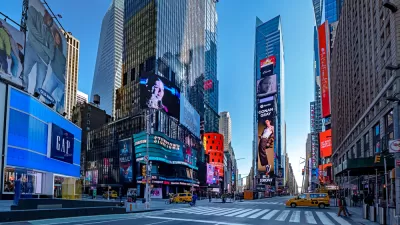A new report by RentCafé reveals the extent of the pandemic's influence on the rental market—so far.

Irina Lupa shares findings of a year-end rental market report from RentCafé, describing the year as tumultuous and the market as adaptable. Still, the emerging practices of virtual tours and contactless property management were unable to prevent a decline in rental activity in most large cities in the country.
Key findings of the report, with more details included in the source article, include the following:
- Renting activity was 10% slower in 2020, with a shorter rental season that started with a two-month delay
- Gen Z overtook Gen X and is the only renter generation that became more active this year
- 18 of the 30 largest U.S. cities saw more renters leaving compared to last year
- Apartment rents decreased in all top 10 most expensive cities for renters in 2020
As summarized by Lupa, the trends of the year do reveal fundamental changes to the rental market—changes that will have a direct impact on the social and economic makeup of the country once the coronavirus is finally and completely defeated.
A new cohort of renters, Generation Z, is now the second most active group of renters, overtaking Gen X-ers, while the front-runner generation of Millennial renters is shrinking. In terms of moving, there was an increase in renters who decided to move out of some large cities in 2020, including Detroit, New York and Seattle. And finally, 2020 was the year when rent prices fell in all of the nation’s ten most expensive large cities for renters, with San Francisco, New York, Boston and Seattle in the lead.
In addition to the more documented and discussed factors contributing to these trends, the article also notes that renters are dealing with stagnant wages for the first time in years, and provides specific data on rental prices and rental activities in cities all over the country.
Given that eviction moratoriums are still in place at numerous levels of government around the country, and stay-at-home orders and other restrictions are being added in numerous locations around the country as a third wave of infections takes a terrible toll on the country, the pandemic's influence on the rental market in cities is likely to be felt for several years to come.

Planetizen Federal Action Tracker
A weekly monitor of how Trump’s orders and actions are impacting planners and planning in America.

Maui's Vacation Rental Debate Turns Ugly
Verbal attacks, misinformation campaigns and fistfights plague a high-stakes debate to convert thousands of vacation rentals into long-term housing.

San Francisco Suspends Traffic Calming Amidst Record Deaths
Citing “a challenging fiscal landscape,” the city will cease the program on the heels of 42 traffic deaths, including 24 pedestrians.

Amtrak Rolls Out New Orleans to Alabama “Mardi Gras” Train
The new service will operate morning and evening departures between Mobile and New Orleans.

The Subversive Car-Free Guide to Trump's Great American Road Trip
Car-free ways to access Chicagoland’s best tourist attractions.

San Antonio and Austin are Fusing Into one Massive Megaregion
The region spanning the two central Texas cities is growing fast, posing challenges for local infrastructure and water supplies.
Urban Design for Planners 1: Software Tools
This six-course series explores essential urban design concepts using open source software and equips planners with the tools they need to participate fully in the urban design process.
Planning for Universal Design
Learn the tools for implementing Universal Design in planning regulations.
Heyer Gruel & Associates PA
JM Goldson LLC
Custer County Colorado
City of Camden Redevelopment Agency
City of Astoria
Transportation Research & Education Center (TREC) at Portland State University
Jefferson Parish Government
Camden Redevelopment Agency
City of Claremont





























